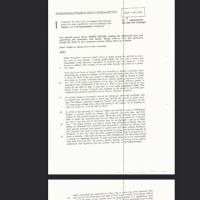TEXT
When “Professor” Joad was caught trying to dodge paying his rail fare in Janu-
ary 1948 he was already a famous public figure. He was also a writer and
broadcaster whose favourite expression “It depends what you mean by ...” was
known to millions. The incident of the rail ticket brought his career to a prema-
ture close.
Cyril Joad was born in August 1891 and educated at Oxford University. After
completing his studies he became a civil servant and during this time he began
to write the first of his many books on philosophy. In 1930 he started to teach
the subject at London University but never, strictly speaking, became a “profes-
sor”. One of the great popularisers of his time, he helped ordinary people to
understand the complexities of the universe. This is one of the reasons he was
chosen by the BBC in 1941 to take part in a new radio programme called “The
Brains Trust”. A group of experts met regularly in the studio to deal with phil-
osophical and practical problems and to answer listeners’ questions.
He quickly became everybody’s idea of the stereotype university professor, and
so popular that the police had to escort him through the crowds at public meet-
ings. The famous humorous magazine “Punch” once carried a caricature of him
in a restaurant talking about soup and saying to the waiter, “It all depends on
what you mean by (a) thick and (b) clear.”
At 10.50 on the morning of 5 January 1948 Joad boarded a train at Paddington
Station in London bound for Exeter. His secretary was with him, and both
booked for the second sitting at lunch. When the ticket collector came to their
table at lunch, his secretary held out her ticket but Joad explained, “I haven’t
got one. I was late and at the barrier they let me through. I got on at Salis-
bury.” The ticket collector gave him a return from Salisbury to Exeter. But the
dining car attendant had overheard the conversation and told the collector that
Joad and his secretary had booked for lunch before the train reached Salisbury.
The collector went back to Joad, who persisted in saying that he had boarded at
Salisbury. It was only when the train stopped at Exeter that Joad admitted, “I
made a mistake. I did come all the way from Paddington.” He had indeed made
a mistake by admitting his guilt. If Joad had kept silent, he would undoubtedly
have heard the last of it. He made a further mistake by writing to the railway
authorities and explaining that the problem had been a “misunderstanding”.© Fernschulen Hamburg© Fernstudienzentrum Hamburg
2
Vocabulary Notes
Part A: Comprehension
Answer the following questions about the text, using complete sentences.
1. What caused the end of Joad’s career in 1948?
2. What was unusual about his academic career?
3. Why was he chosen by the BBC to join “The Brains Trust”?
4. What was Joad’s explanation when the ticket collector wanted to see his ticket
at lunch?
5. How was this version contradicted?
6. What were the mistakes that Joad made?
7. Why did the authorities decide to prosecute Joad?
8. What led the BBC to end Joad’s appearances on “The Brains Trust”?
35
40
45
50
What persuaded the authorities to take Joad to court was their discovery that
this was not the first time, and that he had made a habit of travelling without
a ticket for years. A few months later he pleaded guilty at a magistrates court
to “unlawfully travelling on the railway without having previously paid his fare
and with intent to avoid payment”. He was given a fine and had to pay the
costs of the court case. On the same evening he appeared as usual on “The
Brains Trust”.
A few days later a Member of Parliament raised the matter, saying: “In the last
week a public figure was convicted for telling lies and defrauding the public.
The very same evening he was hired by the BBC to entertain people.” As a
result, Joad never again appeared on the famous programme. Less than five
years later he died of cancer.
The most interesting question is why did he do it? Nobody really knows,
although there have been several explanations. Some people pointed out that
Joad was known to be mean and avoided paying for his round of drinks in pubs
whenever possible. Others argued that he was really a natural rebel and even
though he had a reputation as a member of the establishment, he felt the need
to show his lack of respect for authority.
to dodge fares (l. 1) to travel without a ticket
let me through (l. 24) At the time of this incident passengers needed to show
their ticket at the entrance to the platform, often called
the “barrier”, before they could board the train. Most sta-
tions in the UK now have electronic ticket gates.
fine (l. 38) a financial punishment
to defraud (l. 42) to cheat or deceive© Fernschulen Hamburg© Fernstudienzentrum Hamburg
3
9. What two main reasons are given for Joad’s offence?
10. Do you think the BBC was justified in its action? Explain your opinion.
Part B: Vocabulary
Before doing this exercise please look back at Vocabulary Exercise 5.1.2. The prin-
ciple is exactly the same.
1. The judge asked the _____________________ to speak a little louder. (DEFEND)
2. A lot of food prepared in prisons is unfortunately rather
_____________________ . (TASTE)
3. Do you think prison today can still be a _____________________ ? (DETER)
4. Konrad Lorenz was one of the great animal _____________________ of the 20th
century. (SCIENCE)
5. If living conditions are _____________________ , aggressions can easily develop.
(CROWD)
6. This is not a business trip, it is just for _____________________. (PLEASE)
7. The letter received by the news agency was _____________________ by “Jack
the Ripper”. (SIGN)
8. It is strange that when the police first questioned Peter Sutcliffe they never
became _____________________ . (SUSPECT)
9. Fortunately the murder hunt proved to be a _____________________ . (SUC-
CEED)
10. You are to imagine you are the detective _____________________ a series of
crimes. (INVESTIGATE)
Part C I: Grammar
Choose the correct form of the verb in the following sentences:
1. If the police ________________________ (not believe) me, I would certainly have
been arrested.© Fernschulen Hamburg© Fernstudienzentrum Hamburg
4
2. She told me she ________________________ (bake) a cake for her husband in
prison.
3. I ________________________ (inform) my boss at the supermarket immediately,
if I see anybody stealing things from the shelves.
4. He threatened he ________________________ (shoot) the hostage, if the bank-
tellers didn’t give him all the money he wanted.
5. Corinna said that despite all the dangers she ________________________ (enjoy)
her job as a policewoman.
6. The bank robber warned me ________________________ (not, press) the alarm-
bell.
7. Ryan enquired whether I ________________________ (see) the Old Bailey when
I was in London.
8. If the politician had not been assassinated, do you think things
________________________ (remain) the way they were?
9. The policeman asked me if I ________________________ (have) any previous
convictions.
10. Even if you decide to keep all the stolen money, ________________________
(able, sleep) at night?
11. Pinto says he ________________________ (not, want) any mistakes like last
time.
12. He wanted to know whether I ________________________ (visit) him again
while he was in prison.
Part C II: Grammar
Choose the correct modal verb to complete the following sentences:
1. “This _____________________ be the man we’re looking for,” said one of the
policemen. “You _____________________ be right,” replied his colleague.© Fernschulen Hamburg© Fernstudienzentrum Hamburg
5
2. “You _____________________ say anything now, but I _____________________
warn you that anything you do say may be taken down and used in evidence
against you,” the policeman warned the suspect.
3. When he was at Scotland Yard, Geoffrey Haggart had to decide administrative
matters such as whether there _____________________ be a police box in a par-
ticular place.
4. If you want to make your home safe, you _____________________ install safety
locks on all the windows.
5. You _____________________ say a word of this to anybody else, otherwise our
plans will be ruined!
6. In theory there _____________________ be any differences in the treatment of
criminals, but in practice there are.
Part C III: Grammar
Choose a suitable modal form of the verb in the following sentences. In each case
you are making a comment on a past action.
1. If the laws at the time had been stricter, Savundra _____________________
(swindle) so many motorists.
2. The man who attacked Mrs Parker _____________________ (be) some kind of
pervert.
3. The responsible members of the old regime _____________________ (punish) for
their crimes against humanity just like all other criminals.
4. Where _____________________ (the killer, bury) the body?
5. “You _____________________ (come) all this way to the police station, madam,”
the Inspector said to the witness, “I could have taken a statement from you
at your house.”
6. “The rain _____________________ (wash) away all the footprints left by the
burglar,” the detective told his assistant.© Fernschulen Hamburg© Fernstudienzentrum Hamburg
Part D: Comment
Answer ONE of the following questions. Write about 250 words.
1. Write a short story called “The Perfect Crime”.
2. Imagine you are a newspaper journalist and have just interviewed the witness
of a crime. Write the newspaper article about the crime, remembering to
include references to what the witness said.
3. “Crime doesn’t pay” is an English idiom, but is it true? Give your opinion
based on your personal observations.
 2.22
2.22
 2.22
2.22
 Bewertungen
Bewertungen
 Benötigst Du Hilfe?
Benötigst Du Hilfe?
 Was ist StudyAid.de?
Was ist StudyAid.de?
 Rechtliches
Rechtliches
 Mehr von chrisis
Mehr von chrisis


;)






